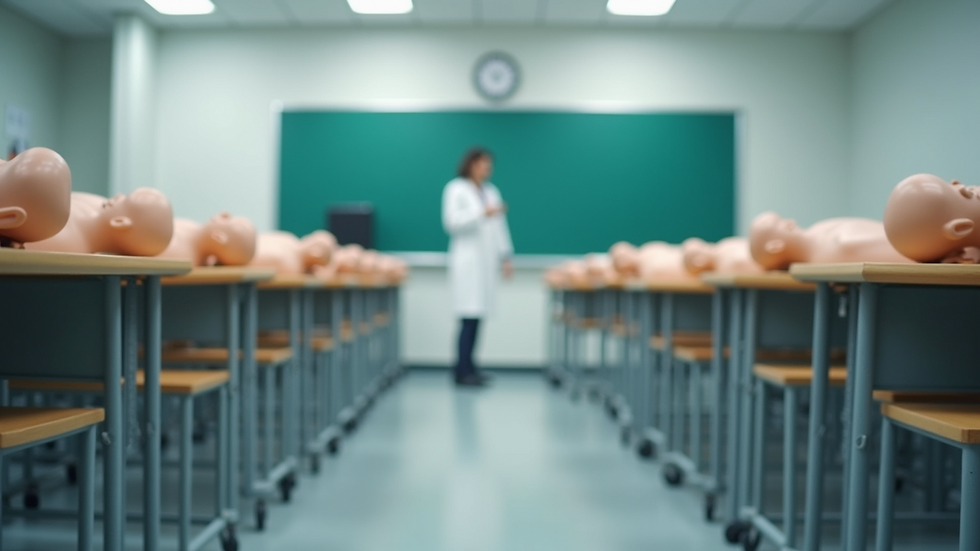CPR AED | Trip to the gym ends in cardiac arrest for California woman
- Jul 13, 2020
- 3 min read

Cathie Lazarus likes to tell people she has two birthdays now. The one when she was born, and the other when bystanders performed CPR after her heart stopped on March 11, 2013.
Lazarus, who lives in Sherman Oaks, California, doesn’t remember much about the day she had a cardiac arrest. She remembers going into the gym and was later told she had complained of being tired.
The next thing she remembers is waking up in a hospital three days later.
Lazarus, then 51, had collapsed while working out. Two bystanders started CPR while a third went to get an automated external defibrillator, or AED. The AED was unable detect a shockable rhythm, so Lazarus’ fellow gym members continued CPR until paramedics arrived.
“I was really lucky to be in a public place,” Lazarus said. “If it would have happened an hour later, I would have been home alone.”
Nearly 360,000 out-of-hospital cardiac arrests occur each year in the U.S., but despite advancements in resuscitation science, only about 10 percent survive. Effective bystander CPR, provided immediately after cardiac arrest, can greatly increase a victim’s chance of survival.
It took paramedics half an hour to stabilize Lazarus’ heartbeat. She was taken to the hospital and put into an induced coma to allow her brain to rest, before being revived slowly after three days.
Testing revealed she had hypertrophic cardiomyopathy, a thickening of the heart muscle between the ventricles. Lazarus had been born with the condition, which went undiagnosed and created an obstruction, making it more difficult for blood to flow through the heart.
Before leaving the hospital, Lazarus received an implantable cardioverter defibrillator, or ICD, that will provide a lifesaving shock if the device ever detects a dangerous heart rhythm.
Lazarus had been told she had a heart murmur at age 18 but that it didn’t require treatment or further monitoring. Hypertrophic cardiomyopathy can be inherited, and tests following Lazarus’ cardiac arrest revealed one of her sisters shares the condition and also needed an ICD.
Lazarus started walking a few weeks after her cardiac arrest. But it would be more than two years before she joined a gym again.
“It was a really big deal for me to get the nerve to do it,” she said.
Today, Lazarus walks and hikes and tries not to let any lingering fears about her cardiac arrest hold her back.
“I went skydiving this summer for the first time,” she said. “I’m not limiting myself.”
Surviving a cardiac arrest opened her eyes to the importance of CPR. She had undergone training when her two daughters were young, but hadn’t renewed it in more than 15 years.
“It was just one of those things that you knew was important, but just got away from you,” Lazarus said. “Now, I’m hyperaware of it, and I bring it up all the time to people.”
Lazarus has made raising awareness about the importance of CPR training a priority.
As soon as she returned to work, Lazarus convinced her employer to offer CPR training, and encourages friends and family to learn resuscitation skills and to understand how to use AEDs.
“People write to me, saying, ‘Because of you, I got certified,’” she said. “It makes me feel good that people are taking it seriously and getting trained.”
Less than eight months after surviving her cardiac arrest, Lazarus participated in the American Heart Association’s 2013 Santa Monica Heart Walk, and was the event’s top fund raiser, netting nearly $8,000 in donations.
Now 54, Lazarus shares her story at local events. She also pushed for a CPR segment on Access Hollywood, where she works in production.
“I’ve found my purpose now,” she said. “It’s been two and a half years, but I still think about it all the time. It’s still mind-blowing to me that I survived.”
Learn more about CPR AED. Bergenfield, NJ, Jersey City, NJ, Livingston, NJ, and Queens, New York and Gainesville, FL.
Source: https://newsarchive.heart.org





AV在线看 AV在线看;
自拍流出 自拍流出;
国产视频 国产视频;
日本无码 日本无码;
动漫肉番 动漫肉番;
吃瓜专区 吃瓜专区;
SM调教 SM调教;
ASMR ASMR;
国产探花 国产探花;
强奸乱伦 强奸乱伦;
代发外链 提权重点击找我;
蜘蛛池 蜘蛛池;
谷歌马甲包/ 谷歌马甲包;
谷歌霸屏 谷歌霸屏;
谷歌霸屏 谷歌霸屏
蜘蛛池 蜘蛛池
谷歌快排 谷歌快排
Google外链 Google外链
谷歌留痕 谷歌留痕
Gái Gọi…
Gái Gọi…
Dịch Vụ…
谷歌霸屏 谷歌霸屏
负面删除 负面删除
币圈推广 币圈推广
Google权重提升 Google权重提升
Google外链 Google外链
google留痕 google留痕
代发外链 提权重点击找我;
游戏推广 游戏推广;
Fortune Tiger Fortune Tiger;
Fortune Tiger Slots Fortune…
谷歌马甲包/ 谷歌马甲包;
谷歌霸屏 谷歌霸屏;
מכונות ETPU מכונות ETPU;
;ماكينات اي تي بي…
آلات إي بي بي…
ETPU maşınları ETPU maşınları;
ETPUマシン ETPUマシン;
ETPU 기계 ETPU 기계;
google seo google seo技术飞机TG-cheng716051;
03topgame 03topgame
gamesimes gamesimes;
Fortune Tiger Fortune Tiger;
Fortune Tiger Slots Fortune Tiger…
Fortune Tiger Fortune Tiger;
EPS машины EPS машины;
Fortune Tiger Fortune Tiger;
EPS Machine EPS Cutting Machine;
EPS Machine EPS and EPP…
EPP Machine EPP Shape Moulding…
EPS Machine EPS and EPP…
EPTU Machine ETPU Moulding Machine
EPS Machine EPS Cutting Machine;
google seo…
03topgame 03topgame
gamesimes gamesimes;
Fortune Tiger…
Fortune Tiger…
Fortune Tiger…
EPS Machine…
EPS Machine…
seo seo
betwin betwin;
777 777;
slots slots;
Fortune Tiger…
谷歌seo优化 谷歌SEO优化+外链发布+权重提升;